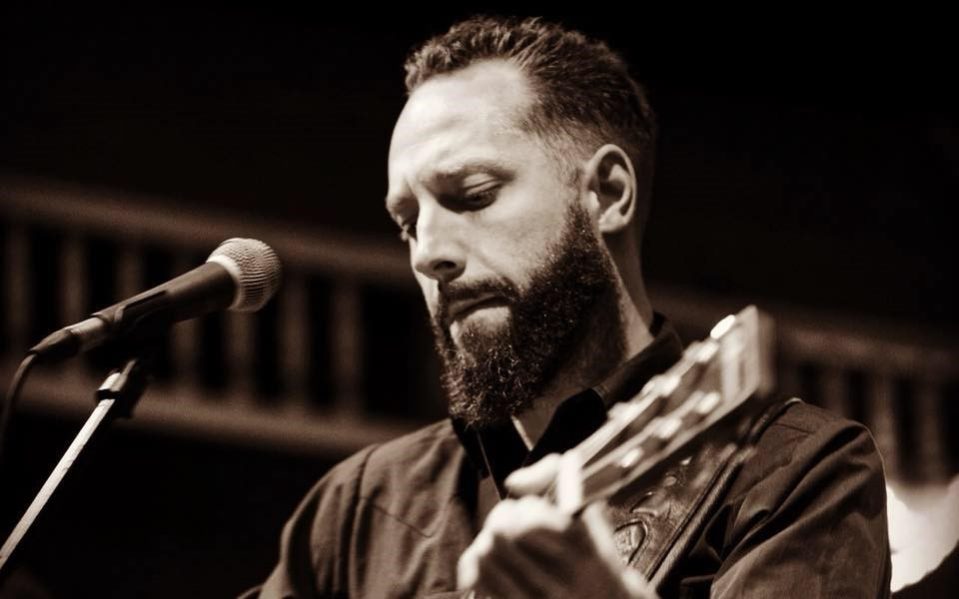The Reinvention of Sean Oliver

Prior to the release of his latest album Songs Left to Sing, Ottawa based singer-songwriter Sean Oliver had resolved to quitting playing music altogether. Having played outlaw honky-tonk under the moniker Uncle Sean for eight years and releasing two albums with his band The Shifty Drifters (Drinkin’ Ramblin’ Honky Tonkin’ in 2011 and Honky Tonk Heart in 2013), he hit a wall after a series of setbacks in his creative and personal life that made the process no longer enjoyable.
“I was frustrated with the scene, frustrated with the genre, frustrated with my personal life. I honestly didn’t want to play music anymore.”
His sabbatical lasted a few years but with space to breathe and a desire to play an active role in his own healing, Oliver turned once again to his passion for songwriting with the intention of finding catharsis. It was through this process that his latest album started to take shape—as he moved away from the boot-stompin, barroom hoppin’ content of his past work and stumbled upon a new sense of vulnerability, he found himself wanting to release his new music under his own name.
“I was writing about real things that happened to me, things that hurt me and scarred me. I felt that I needed to put a name and face to the songs.”
When asked what changed in regards to his attitude towards the country genre he still calls home, he states that his initial approach was to keep the outlaw tradition alive and placed an emphasis on creating music that was fun to listen and dance to. Now he turns inward, accessing a more impassioned side of himself that he had yet to breach and the results are a spill of emotions he never really intended people to hear, though he’s come to understand this makes his music more relatable.
“I’ve realized that it’s about putting it all out there, spilling your guts, whether people like it or not. That’s outlaw, that’s country.”
Growing up playing punk and metal music, Oliver had a fairly myopic view of country music as a young man (“Willie, Waylon, Merle, Johnny, and Hank.”). It wasn’t until he attended Muddy Roots, a Tennessee-based music festival that features everything from roots blues to punk rock iterations of the country western genre, where he was confronted with thousands of folks just like him whose punk rock roots led them down the dusty country road.
“I realized that real country music was still alive, that there was amazing songwriters out there, original songwriters. People playing and singing whatever the fuck they wanted to.”
But being an original songwriter is not always such a revelatory or enjoyable experience, especially when the well one is tapping from is deeply personal and tends to run dry at the least opportune of times. Oliver describes his relationship with writing as “love/hate” due to an extended history of struggling to do so when he needs to the most, when he is experiencing the pain and sorrow that he wishes to capture. In recent years, he’s taken to forcing himself to write at his most low, and therefore most raw, or at least to document the feelings in less structured ways. The unexpected upside, he explains, is the ability for songwriting to drag him out of his misery, perhaps due to his greater understanding of what led him there.
With this new found skill under his belt and enough material to release a record, Oliver turned to his former bandmates Karolyne Lafortune, Stephen K Donnelly, and Anastasios “Ernie” Basiliadis, whom he describes as his best friends and invaluable to his music. Donnelly is not only a multi-instrumentalist and vocalist on every track on the album, but he produced, engineered, recorded, distributed, and marketed every album that Oliver has ever released. Basiliadis has played drums for Oliver for over eight years and is a huge source of emotional support. Lafortune provides backing and duet vocals as well as her masterful fiddle playing, and she acts as Oliver’s creative partner and filter.
“There’s seldom a thought or idea that runs through my head that isn’t run by her. Every bad idea I’ve ever had, she’s shut down.”
Additionally, the new album features Stuart Rutherford on pedal steel, pianist extraordinaire Jim McDowell, Evan Dalling on Trumpet, and Robert Alexander on accordion. The core band consists of Oliver, Lafortune, Donnelly, Basiliadis, Rutherford and McDowell, though occasionally additional musicians will sit in. Oliver often plays in and around Ottawa solo with the main difference in performance being how vulnerable he feels on stage and his increased ability to connect with his audience. That said, playing the outlaw genre often means playing in a large and busy room, and the wall of sound his band affords him allows him to punch through the chatter. However, in a quiet room, he’s just as capable of stripping down his songs and connecting emotionally with his audience solo as he is with his band.
That’s the driving force behind Oliver’s music, his desire to connect. “Music is pure group therapy, whether on stage or in the crowd. We’re all there experiencing it together.” His experience within the Ottawa music scene has been overwhelmingly positive and he often donates proceeds from his shows to various local charities (after paying his band) in an effort to give back.
His most recent endeavour involved the creation of two live videos to showcase how his music has matured with time, performing “Tried to Walk Away” with Lafortune, Donnelly, Basiliadis, Rutherford, and “Two-Stepping for One,” a duet with Lafortune. Recorded at their familiar haunt The Rainbow Bistro with audio by Stefan Jurewicz and video by Dominic Llanos, Oliver explains that without the pressure of playing a gig, it was easy to capture the joy and comradery present in the band’s dynamic.
“All we want people to see is the live atmosphere you’ll experience at one of our shows. We always have an amazing time, and we want our fans to experience the same.”
Watch the premiere of Sean Oliver’s singles “Tried to Walk Away” and “Two-Stepping for One” now and experience the full band live at Bar Robo on January 19th or with Ray Harris at Irene’s Pub on February 2nd.
